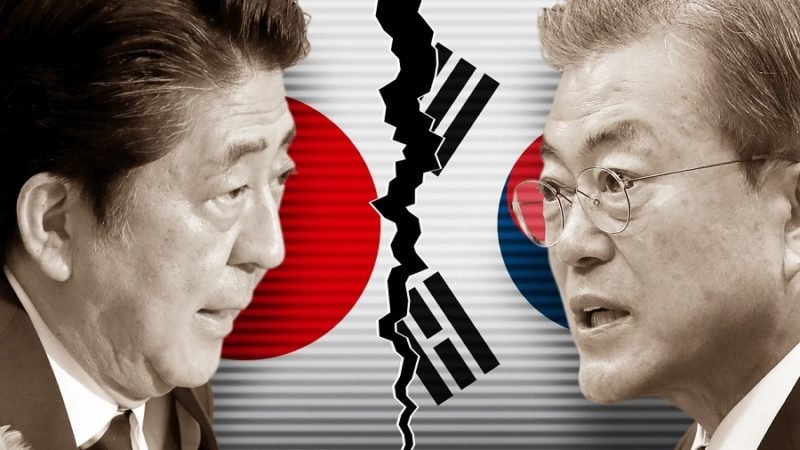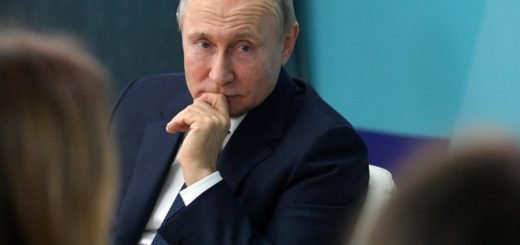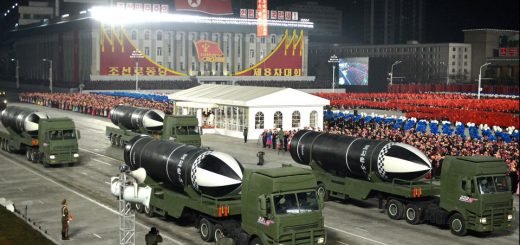Deepening Divergences in Japan and South Korea Relations

East Asia is once again in news, drawing myriads of global attention with the scaling of trade friction between two of the prominent Asian industrial giants, technological powerhouses and neighbours, Japan and South Korea. The recent export restriction by Japan on three materials i.e. fluorinated polyimide resist and hydrogen fluoride critical to the manufacturing of semiconductors and smartphone displays to the Korea tech industry is the hallmark of growing bitterness between the two. This came as a result of S. Korean court rulings ordering Japanese companies to compensate the victims of war times forced labours and sex slaves. The use of economic tools in foreign policy or political dispute through sanctions, tariff impositions etc have acquired a formidable place in recent years in dealing with adversaries.
The 1965 treaty normalized relations between Japan and South Korea with the reestablished of diplomatic relations between both the countries, under which Tokyo gave Seoul $500million in aid and low-interest loans, $300million in grants, towards a complete and final settlement of the “problems concerning property, rights, and interest of the two nations and their people and claims between them… (Article II) “Completely and finally”. This was followed by Kaifu Apology, 1994 Asian Women’s fund and 2015 Comfort Women agreement. From the Korean perspective that the abovementioned treaty and following compensations are not fair to deal and the nation had no choice but to accept the agreement. The declassification of documents of the 1965 treaty in the year 2005 presented the clear picture of negotiations and sparked huge controversy thereafter. The treaty didn’t mention the funds were compensation for Japan wartime aggression rather a goodwill gesture to reestablish relations. According to general masses, the previous agreements and apologies illegitimate because comfort women and forced labour were left out of negotiations process. Almost 200,000 undivided Korean women were the victims of unconscionable treatment during World War II. Also, the continued visits of Japanese politicians to the Yasukuni Shrine in Tokyo, where the spirits of 14A-class criminals of war are also housed enlarged rift from time to time.
President Moon challenged the base of 2015 agreement, commissioned a report and urged Japan to “accept the truth and apologize with a sincere heart”
Japan believes that the funds were utilized to compensate the victims directly instead pump the capital into the economy, which eventually led to robust economic growth and infrastructures development in South Korea. In addition, the recent development in the Korean peninsula and re-engagement of two Koreans also, seen by Japan with huge scepticism as the issue of transfer of hydrogen fluoride to North Korea from South Korea is the glare instance in this regard.

At this crucial juncture when the establishment of peace seems to be possible in the region because of the initiation of the dialogue process and engagement with North Korea by the US at the highest level. Marked by the two historic summits between the US President Trump and North Korea Premier Kim Jong Un and the resultant reengagement of two Korean states has opened a sea of possibilities, very crucial and strategically important development not just for the region but, also globally. Both Seoul and Tokyo are impacted by the unprecedented rise of assertive China, the threats posed by Pyongyang’s WMD program and Russia to a lesser extent. In contrast, the two prominent U.S allies Japan and South Korea are now drifting away from their existing set of relations, which are a blend of strategic compulsion, transactional cooperation and historical animosity.
Amidst these odd scenarios even, President Lee Myung-bak’s administration was elevated the Korean-Japan relationship to “Democratic Alliance”. And then suddenly the ties took a hammering. The inclusion of South Korea in Japan’s “white list’ of countries that receive preferential trade treatment was quite historic in many regards. President Park Geun-Hye in 2016 approved the signing of the General Security of Military Information Agreement (GSOMIA) with Tokyo, which enables the direct exchange of confidential military information mainly to counter the WMD threat from North Korea. This happened after the agreement on the Comfort Women issue in December 2015, Japanese PM Shinzo Abe expressed his “apologies and remorse” the victims and provided 1 billion yen to support the affected women and their families.
The recent controversial ruling by South Korean court coincided with the current PM Shinzo Abe election victory in the upper house of parliament, Diet. PM Abe has led his ruling Liberal Democratic Party to five consecutive parliamentary elections. The election verdict was aimed at giving a full short majority to the ruling government in order to carry out the amending of Japan’s constitution by 2021 in Abe’s term only. Although, the pro amending parties were not able to get the desired number to move a proposal for the same and thus, the constitutional amendments halted for the time being.
This sudden victory domestically would further tighten the grip over trade with Seoul and deal blow to companies in South Korea. Also, there is a fear of flight of Japanese capital invested heavily in Korean companies by Japanese firms. According to the latest data, an amount of 20.10 trillion Won Koreans banks and credit finance companies have borrowed from Japanese investors and lenders.
Post poll wins, in an interview to Asahi TV, PM Abe said there will be no constructive discussion regarding the two countries’ trade conflict unless Korea brings “a proper answer” to its breach of 1965 treaty between Tokyo and Seoul.
Japanese chief secretary Suga Yoshihide said: Japan’s government has clearly lost patience with president Moon. And Japans exports curbs are based on national security reasons.
South Korean President Moon also reiterated in the same tone, he said: “Japan’s export restriction has broken the framework of economic cooperation between South Korea and Japan that had continued for over half a century based on mutual dependence”. And eventually, it will be the Japanese economy that will be damaged more.
South Korean took the matter to the WTO, demanding Japan shun its unilateral acts. The report from the Tokyo side said it had imposed the sanctions because of “inadequate management” of export by Seoul.
Also, a contingency plan is getting in place for any sudden flight of Japanese capital. The use of economic tools in foreign policy or political dispute through sanctions, tariff impositions etc have acquired a formidable place in recent years in dealing with adversaries. A reflection of the worldwide trend used vehemently by great powers.
U.S a prominent ally and important economic partner to both the countries are keenly following the development. The U.S has been hesitant to publicly wade into the feud between its allies. As an external actor and a global superpower, it has played a crucial role in diffusing tensions in the region from time to time. The U.S diplomat on East Asia policy David Stillwell told the reporters in Seoul that he took the situation seriously but did not elaborate on what steps Washington might take and sought fundamentally it was Japan and South Korea to resolve their differences. President Moon has already sought Washington’s intervention. It’s high time for the U.S to seat its allies down, for a frank and constructive chat.

Given the current state of affairs, it is highly pertinent to resolve the dispute because of larger and grave repercussions in the region and beyond. The disruption in the supply chain of smartphones and other devices is one of the major concerns besides, providing China with an opportunity to cede the market share in its favour. Above all, for the establishment of long and lasting peace in the wake of negotiations with belligerent North Korea, aggressive China, the reducing role or totally departing of US as a security provider in the region. Therefore, any dispute escalation based on the historical problem would hinder the progress of both countries equally. A comprehensive and forward-looking resolution is what needed in the current scenario between the two neighbours.
References:
- Editorial Board. “Abe’s Trade War with South Korea Is Hopeless.” Bloomberg, 22 July 2019.
- “Japan Votes for Upper House, Shinzo Abe’s Party Seen as Favourite.” Indian Express, 21 July 2019.
- Johnston, Eric. “Abe’s Push to Maned Japanese Constitution Faces Uncertain Future after Upper House Votes .” Japan Times, 2019.
- Purba, Kornelius. “Japan South-Korea Quarrels Annoying for Neighbors.” Jakarta Times, 25 July 2019.
- Woo, Nam Hyun. “Korean Firms on Edge over Post Poll Impact.” The Korean Times, 23 July 2019.
- Zhou, Laura. “Japan-South Korea Tensions Could Dash China’s Hope Fro Trade Deal.” South China Morning Post, July 19AD.
- Eun, Kim Bo. “S. Korea Braces for Possible Japanese Capital Flight.” The Korean Times, July 2019.



















